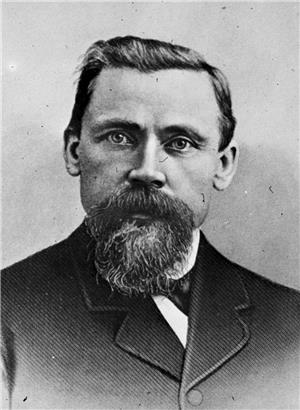On July 14, 1873, voters elect Democrat John Collins as mayor of the City of Seattle. He was a businessmen and industrialist whose interests included coal mining, real estate, public utilities, and publishing.
He was one of four investors in the Talbot Mine, opened in 1874. The mine was one of the largest in the Newcastle district, near Renton, with a subterranean tunnel that was 16 feet wide, 11 feet high, and more than 450 feet long. The coal was shipped by rail to a landing on the Black River and from there to Seattle.
Collins was also an investor in the Seattle Gas Light Company, incorporated in 1873 to develop a coal gas plant and lay pipes to furnish gas lighting for streets, residences, and businesses in the young town of Seattle. Under the generous terms of a franchise granted by the town council, the Seattle Gas Light Company held exclusive rights to furnish gas for 25 years. His railroad interests included the Seattle & Walla Walla Railroad & Transportation Company, organized in 1873 in response to the decision of the Northern Pacific Railroad to locate its western terminus on Commencement Bay in Tacoma instead of in Seattle.
Collins also invested in downtown real estate. His properties included the Occidental Hotel and the Seattle Hotel. By the early 1880s, he was one of the town's wealthiest citizens.
Collins was appointed to the Common Council (predecessor to the City Council) in 1869, when the Territorial Legislature granted a charter to the City of Seattle. He was elected to another term on the council in 1874, after completing his one-year term as mayor. (At the time, mayors and councilmen served one-year terms; elections were held on the second Monday in July.)
During his tenure as mayor, Seattle adopted the first ordinances regulating the operations of railroads within the city limits.
Collins briefly returned to the mayoral post in 1881, when he was appointed acting mayor for about a one-month period. His second tenure in the office was notable primarily for his signature on an ordinance relating to the municipal water supply. He continued to be involved in civic affairs for the next two decades. Among other activities, he served as a member of a commission to write a new city charter in 1890, and as chairman of a committee to build a new city hall and jail in 1892.
Collins ventured into the publishing business in the early 1890s. He briefly owned both the Press Times (predecessor to The Seattle Times) and the Seattle Daily Telegraph. According to historian Clarence B. Bagley, Collins "sunk a lot of money" into the news business, but apparently didn't find it profitable (Bagley, Vol. 1, p. 196). He sold the Press Times to buyers who, in turn, sold it to Alden J. Blethen; and he sold the Daily Telegraph to the owners of the Seattle Post-Intelligencer.

